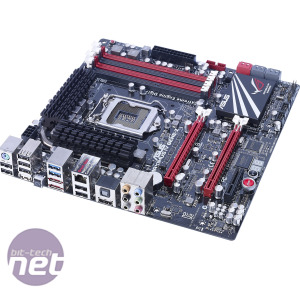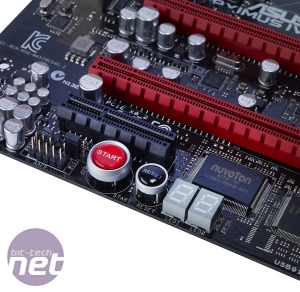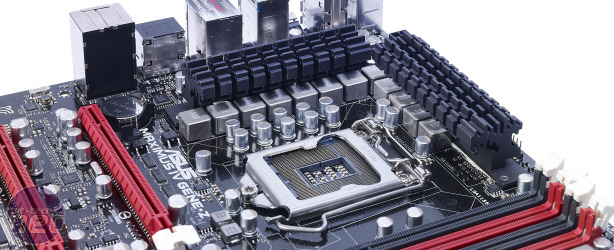
Performance Analysis
We’ve seen very little variation in the stock speed performance of LGA1155 motherboards we’ve tested up until this point. All of them have been quick, and all of them have also been within just a few points of each other in our Media Benchmarks.Imagine our surprise, then, when the Gene-Z scored a storming 1,689 points in our image editing test - a full 71 points ahead of any of the other P67 of Z68 boards we’ve tested. This gap was nothing, though, compared to the 188 points that the Gene-Z put between it and the previous best score we’ve seen in the video encoding portion of the test.
A similarly excellent result in the multi-tasking portion of the suite resulted in the Gene-Z racking up an overall Media Benchmark score of 2,058, which is 6 per cent better that the previous fastest board - the Asus Sabertooth P67. This is an impressive result (so impressive, in fact, that we ran the benchmarks multiple times to check the result), and for the first time shows that it's possible to see meaningful performance differences between LGA1155 boards at stock speeds.
Gaming performance was also good, with the Gene-Z’s minimum frame rate of 76fps in Arma II putting it at the top of the table, albeit tied with the Sabertooth P67. SATA performance was also good, although this is something we've come to expect from Asus motherboards. The SATA 6Gbps ports read data from our test OCZ Vertex 3 drive at a quick speed of 538MB/sec and wrote to it at an equally speedy speed of 499MB/sec.
Overclocking
Asus kits its ROG boards out with flashy ROG-branded EFI systems, which are just begging to be tweaked. They also handily drop you at the Extreme Tweaker menu by default, so it would be impolite to let the Gene-Z get away without being overclocked.Happily, the Gene-Z’s EFI is well laid out and easy to use, enabling you to key in values directly rather than having to wade through long lists of voltages to find the one you want. As a result, it took us a relatively short amount of time to get a stable 5GHz overclock out of the board using an Intel Core i5-2500K CPU. This is 100MHz behind what the seemingly unbeatably overclockable Asus P8P67-M Pro could manage, but it’s a good result nonetheless. To achieve this overclock, we pushed 1.45V through the CPU Vcore, 1.21V through the VCCSA/IO and pumped the CPU PLL up to 1.91V.
The Gene-Z performed well at these speeds, but it didn’t quite keep up the dominant performance we saw from it at stock speeds. Its image editing result of 2,218 was essentially equal to that achieved by the similarly clocked MSI P67A-GD53 and Asus P8P67. This trend continued in the other tests, and meant that the Gene-Z’s overall overclocked score of 2,675 was simply a middle of the road result.
Gaming performance showed similarly mediocre gains when overclocked. We still saw a 4fps bump in the minimum frame rate, but this was a little behind the gains seen from the other LGA1155 boards we’ve tested.
Conclusion
We’ve been genuinely impressed by the Asus Maximus IV Gene-Z ,as it’s the first LGA1155 board we’ve seen to really stand out in terms of stock speed performance. Some may point to the Z68 chipset as the reason, but the previous Z68 boards we’ve seen haven’t performed any differently to their P67 counterparts.As a result, we’re forced to put this extra performance down to the excellent layout of the board and the maturity we’re seeing in Asus’ EFI technology. Either way, though, it’s clear that you do actually get what you pay for with the Gene-Z; it may be £38 more expensive than the excellent MSI P67A-GD53, but you will get more performance at stock speed. It also arguably looks better, and has the added benefit of using the smaller micro-ATX form factor, allowing for greater freedom when choosing your case.
The one flaw in this otherwise unblemished diamond of a board is that its overclocked performance didn’t quite match up to the heady height of its stock speed results. This isn’t enough of an issue to stop us recommending it, however, and anyone looking for a premium LGA1155 motherboard should look no further. Those on a tighter budget will be better off opting for the GD53, but the Gene-Z more than justifies its price if you can afford it.


MSI MPG Velox 100R Chassis Review
October 14 2021 | 15:04











Want to comment? Please log in.